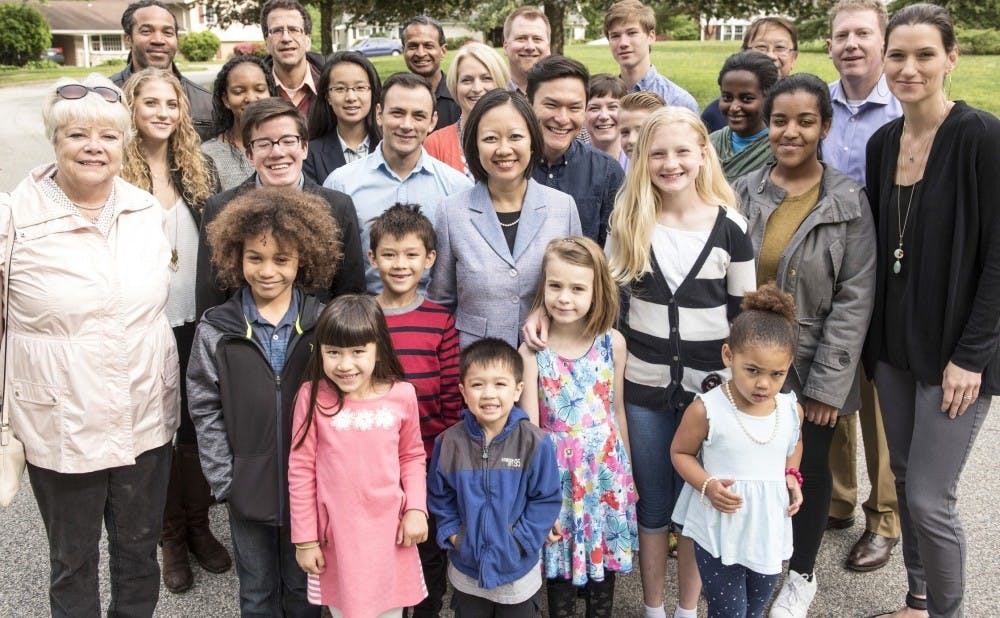Kathy Tran, Trinity '00, attracted attention as part of a blue wave in Virginia in 2017, when Democrats flipped 15 seats in the Virginia House of Delegates. A refugee who arrived in the United States from Vietnam when she was two years old, Tran got her bachelor's degree in history at Duke and worked for 12 years in the Department of Labor.
The Chronicle sat down with her for an interview. This interview has been edited for length and clarity.
The Chronicle: You were elected at the cusp of the #MeToo movement and have since made women’s rights one of your platform issues. What do you see as the biggest challenge to women in your area, and in Virginia?
Kathy Tran: We’re the first state to do provide women in the prison system with free menstrual supplies, which is really cutting edge. We would not have been able to do that without tremendous support from advocacy groups that have been promoting menstrual equity, so that’s one thing.
I’ve also been sponsoring bills that would have changed the statute on limitations on sexual assault. As of right now, if you are a survivor of misdemeanor sexual assault, you have until the age of 19 to report it.
We see the conversation right now with the confirmation of Supreme Court Nominee Brett Kavanaugh—for a lot of different, legitimate reasons, survivors sometimes need more time to report crimes. So, it would have lifted the statute of limitations for them.
TC: You said your Progressive election was a test of values. One of the interesting things about your election was that it was not just a referendum on Trump, per se, but also on the Democratic Party itself through your primary election against Tilly Blanding. Would you consider yourself a Progressive?
KT: I do. In my primary, I say I ran with Tilly, because she is a phenomenal person, and I got a chance to know her and respect her a lot. She’s also a progressive person! My primary was not an election between a Progressive vs. Establishment, for example. I would like to clarify that.
TC: Do you see this as an increasing conflict within the Democratic Party?
KT: I mean, you’ll see—even most recently with the results of the New York primaries—a lot of incumbents who lost. The Democratic Party is a big tent party with room for people with a lot of different ideas. At the end of the day, our party stands for lifting up all the people around us, not just the top one percent, not just the people who have connections, not just the people who have been here forever and ever and ever, but that everybody has an equal opportunity to reach their potential.
TC: Broadly, what’s an issue that you think is important, and what do you think we can do about it?
KT: We didn’t get a chance to talk about this during the talk earlier, but I want to talk about the passage and ratification of the Equal Rights Amendment.
We need one more state to get to 38 and send the ERA back to Congress to ratify. I think Nevada and Illinois passed it this year—Illinois definitely did this year—and so we are just one state away. Virginia is poised to be that state this upcoming year, in 2019.
When you look at the #MeToo movement, when you look at the public discourse from the right right now on the Supreme Court nomination and the allegations that Dr. Ford has brought forward, and the vitriol that she has suffered as a result of it, I think it is so important that we recognize women’s equality in our constitution.
TC: You ran for office because you were disquieted by what was happening in the White House, but not everyone can run for office. What advice would you give to citizens and especially young people at Duke as to what they can do right now?
KT: There are so many different ways to affect change. If you are thinking about electoral politics but are not ready to run, or you don’t think it’s the right thing for you to do, get involved in a campaign. The most important thing for candidates is knocking on doors and making sure people know what they stand for.
Another thing is you can contribute to candidates until we fix campaign finance laws and get real reform, whether it’s a dollar or a thousand, giving to candidates you support. To be honest, I didn’t understand that until I ran for office.
Outside of electoral politics, there’s just so much going on in the country right now on any number of fronts, any number of issues that people should be alarmed by.
Think about whether you want to get involved with local groups working on them. If that local group doesn’t exist, start it yourself, and start building a coalition. Think broadly about who you can bring to the table. And then, if you don’t have any time for that, then what’s just really important is having that one-on-one conversation with your neighbor.
Get The Chronicle straight to your inbox
Signup for our weekly newsletter. Cancel at any time.

